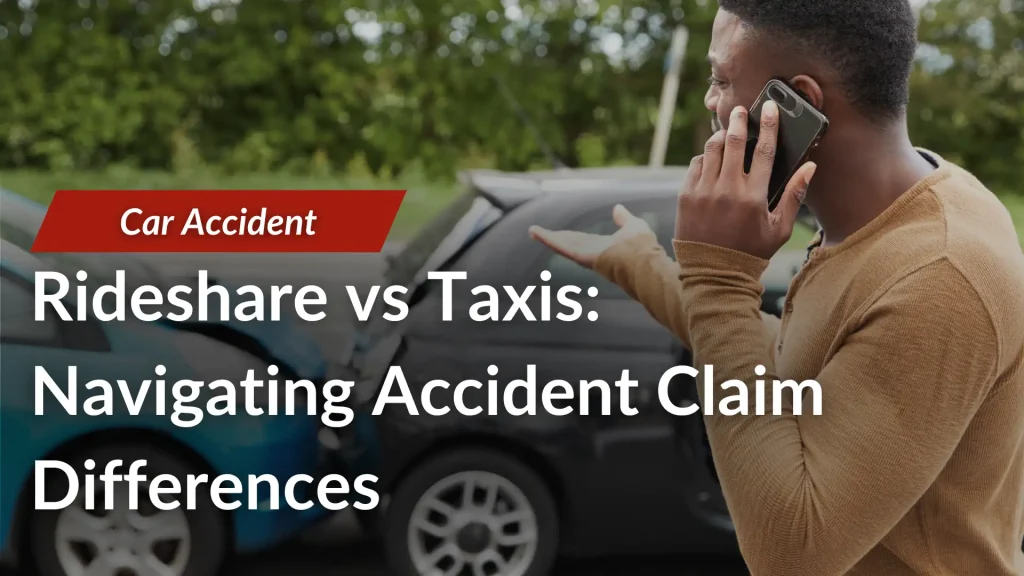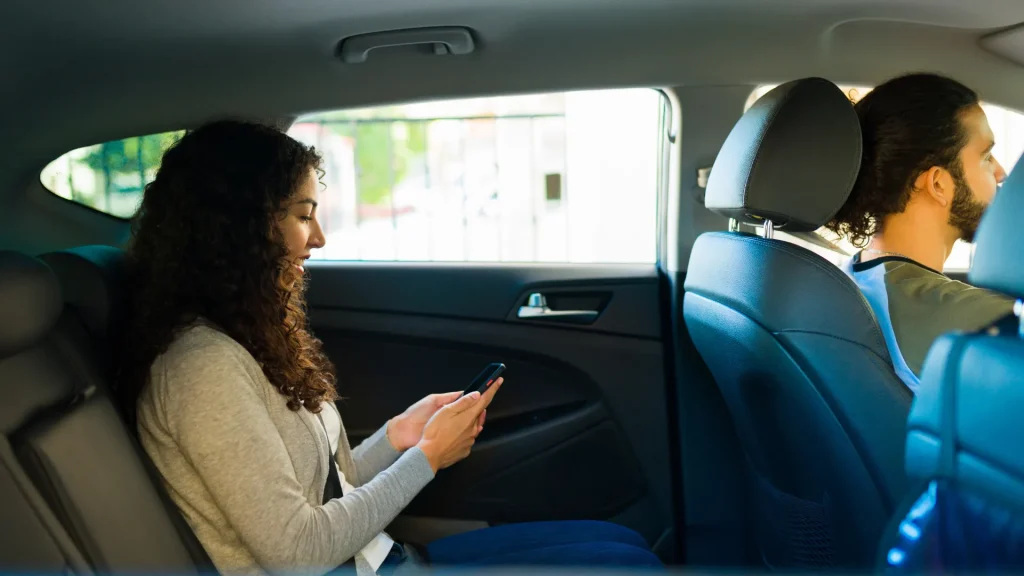
Thousands of Floridians use traditional taxi and rideshare services daily to get from point A to point B. However, taxis and rideshare drivers can get into accidents, and paying passengers might sustain injuries. You might think that making an accident claim against a taxi driver and a rideshare operator would be similar. However, you need to be aware of important insurance and legal differences between rideshare and taxi accident claims. Understanding what makes a taxi accident different from a rideshare can help you file a more effective personal injury claim.
Taxi Driver Required Insurance
Like all commercial vehicles, Florida requires all vehicles registered as taxis to carry minimum insurance coverage higher than the mandated amount for private vehicles.
- $125,000 per bodily injury per person
- $250,000 per person per accident
- $50,000 property damage liability (PDL) coverage
If a taxi driver causes an accident and injures a passenger, their liability policy will pay for the cost of any injuries. Florida taxi insurance does not include Personal injury protection (PIP) coverage. So, if you sustain injuries as a passenger in a taxi accident because of the driver, you would file a claim against your own PIP coverage (if you have it) or against the driver’s liability coverage, highlighting one of the key differences between rideshare vs taxi accident claims and how compensation is handled.
Rideshare Driver Requires Insurance
Insurance for rideshare drivers in Florida is different and more complicated. Florida requires transportation network company (TNC) drivers to carry additional rideshare insurance, but only while logged into the app or actively moving a passenger. When a TNC driver is not on the app, they only need the minimum PIP coverage that is standard for all drivers.
When the app is on, however, Florida law requires TNC drivers to carry a minimum of:
- $50,000 per bodily injury per person
- $100,000 per injury per accident
- $25,000 PDL coverage
TNC drivers must also carry coverage for uninsured and underinsured motorists. A standard auto policy can satisfy these requirements, but many insurance companies won’t allow standard coverage to apply when driving for a rideshare app. In these cases, drivers can purchase an additional rideshare policy to make up the coverage difference.
When the TNC driver is actively moving a paying passenger, they must carry at least $1 million in bodily injury coverage and $1 million in property damage. In most cases, the rideshare company’s liability policy will cover the driver when they are actively driving someone. For example, Uber provides $1 million in liability and property damage coverage when its drivers are transporting customers.
Note that this kind of coverage only applies when the TNC driver is actually moving a passenger — it doesn’t apply when they are waiting for assignment or traveling to pick up the passenger. If an accident occurred during those periods, the driver’s personal auto insurance would be responsible for paying for injuries.
What If Another Driver Causes the Accident?
Taxi insurance and rideshare liability coverage usually only apply when the taxi or rideshare driver is at fault for an accident. If another negligent driver is responsible for the accident, the taxi insurance or rideshare policy would likely not cover any injuries. Instead, the victim would have to file a claim with their own insurance’s PIP policy if they have one. If not, or if they exhaust their PIP policy limits, they can file a third-party liability claim through the at-fault driver’s insurance company.
The situation can get especially complex when both drivers share partial fault. In these cases, filing a claim may require working with both the driver’s personal liability policy and the rideshare company’s commercial liability policy.
However, you still may be able to recover compensation from the taxi or rideshare company if the other driver doesn’t have insurance or doesn’t have enough insurance. If so, you can file a claim through the taxi or rideshare company’s uninsured/underinsured motorist policy. A personal injury attorney can help you explore additional avenues to recover financial compensation.
Legal Differences in Rideshare and Taxi Claims

The differences between rideshare insurance claims and taxi claims come down to differences in the structure of the companies and how insurance coverage works for both.
Employee vs. Independent Contractor
One significant difference between taxi and rideshare companies is how they classify drivers. Taxi drivers may be full-time employees of a larger taxi service. This means that the taxi service can be responsible for negligent driving behavior. Since taxi companies typically maintain control over their fleet and drivers, navigating insurance claims is usually more straightforward.
Rideshare companies, however, typically classify their drivers as independent contractors. Since drivers are not full-time employees, this can limit the company’s liability if they cause an accident. This difference can make it difficult to pursue a rideshare company directly if one of its drivers causes an accident.
When the Accident Occurred
Another layer of complexity concerns when, exactly, the accident occurred. Taxi drivers’ policies typically cover them whenever they are on duty, including before and during passenger transportation. Whether or not a given taxi company’s liability policy applies should be relatively clear in most cases.
Coverage for rideshare drivers, however, depends on whether the accident occurred when the app was off, when the app was on, or when the driver actually had a passenger in the car. Depending on the exact accident circumstances, it can be unclear which coverage should apply. Rideshare companies may appeal to this kind of ambiguity to argue that their driver was not covered under their company policy when the accident occurred.
Insurance Coverage Limits
Taxi drivers usually carry much lower liability insurance coverage than the standard $1 million in coverage that larger rideshare companies provide their drivers when transporting passengers. Given the extreme injuries that automobile accidents can cause, you may have more difficulties recovering adequate compensation in a taxi accident claim report because of the lower limits.
Uber and Lyft Accident Lawyer in Florida
Both taxi and rideshare accident claims present difficulties distinct from typical car accident claims. If you have sustained injuries due to a taxi or rideshare driver, you need an experienced rideshare and taxi attorney to navigate the claims process for you. Our team is here to help you understand your rights and take the first step toward securing the necessary benefits. Contact Jurewitz Law Group Injury & Accident Lawyers online or today at (619) 233-5020 for a case consultation with a personal injury lawyer in Tampa, Florida.
Related Post
Can You Sue for Emotional Distress After a Car Accident in Florida?
How a Police Report Can Impact Your Car Accident Claim in Florida


